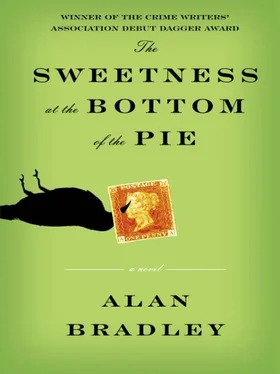Alan Bradley - The Sweetness at the Bottom of the Pie
Здесь есть возможность читать онлайн «Alan Bradley - The Sweetness at the Bottom of the Pie» весь текст электронной книги совершенно бесплатно (целиком полную версию без сокращений). В некоторых случаях можно слушать аудио, скачать через торрент в формате fb2 и присутствует краткое содержание. Жанр: Старинная литература, на английском языке. Описание произведения, (предисловие) а так же отзывы посетителей доступны на портале библиотеки ЛибКат.
- Название:The Sweetness at the Bottom of the Pie
- Автор:
- Жанр:
- Год:неизвестен
- ISBN:нет данных
- Рейтинг книги:3 / 5. Голосов: 1
-
Избранное:Добавить в избранное
- Отзывы:
-
Ваша оценка:
- 60
- 1
- 2
- 3
- 4
- 5
The Sweetness at the Bottom of the Pie: краткое содержание, описание и аннотация
Предлагаем к чтению аннотацию, описание, краткое содержание или предисловие (зависит от того, что написал сам автор книги «The Sweetness at the Bottom of the Pie»). Если вы не нашли необходимую информацию о книге — напишите в комментариях, мы постараемся отыскать её.
The Sweetness at the Bottom of the Pie — читать онлайн бесплатно полную книгу (весь текст) целиком
Ниже представлен текст книги, разбитый по страницам. Система сохранения места последней прочитанной страницы, позволяет с удобством читать онлайн бесплатно книгу «The Sweetness at the Bottom of the Pie», без необходимости каждый раз заново искать на чём Вы остановились. Поставьте закладку, и сможете в любой момент перейти на страницу, на которой закончили чтение.
Интервал:
Закладка:
Ned sat for a moment longer, then wiped his mouth with the back of his hand before rolling the barrel to join the other empties along the far side of the inn yard.
"Hullo, Ned!" I shouted, and he turned, half embarrassed. I knew he'd be wondering if I'd overheard him with Mary, or witnessed the kiss. I decided to be ambiguous.
"Nice day," I said with a sappy grin.
Ned inquired after my health, and then, in order of careful precedence, about the health of Father, and of Daphne.
"They're fine," I told him.
"And Miss Ophelia?" he asked, getting round to her at last.
"Miss Ophelia? Well, to tell you the truth, Ned, we're all rather worried about her."
Ned recoiled as if a wasp had gone up his nose.
"Oh? What's the trouble? Nothing serious, I hope."
"She's gone all green," I said. "I think it's chlorosis. Dr. Darby thinks so too."
In his 1811 Dictionary of the Vulgar Tongue , Francis Grose called chlorosis “Love's Fever,” and “The Virgin's Disease.” I knew that Ned did not have the same ready access to Captain Grose's book as I did. I hugged myself inwardly.
"Ned!"
It was Tully Stoker again. Ned took a step towards the door.
"Tell her I was asking after her," he said.
I gave him a Winston Churchill V with my fingers. It was the least I could do.
SHOE STREET, like Cow Lane, ran from the High Street to the river. Miss Pickery's Tudor cottage, halfway along, looked like something you'd see on the lid of a jigsaw puzzle box. With its thatched roof and whitewashed walls, its diamond-pane leaded-glass windows, and its red-painted Dutch door, it was an artist's delight, its half-timbered walls floating like a quaint old ship upon a sea of old-fashioned flowers such as anemones, hollyhocks, gillyflowers, Canterbury bells, and others whose names I didn't know.
Roger, Miss Pickery's ginger tomcat, rolled on the front doorstep, exposing his belly for a scratching. I obliged.
"Good boy, Roger," I said. "Where's Miss Pickery?"
Roger strolled slowly off in search of something interesting to stare at, and I knocked at the door. There was no answer.
I went round into the back garden. No one home.
Back in the High Street, after stopping for a look at the same old flyblown apothecary jars in the chemist's window, I was just crossing Cow Lane when I happened to glance to my left and saw someone stepping into the library. Arms outstretched, I dipped my wings and banked ninety degrees. But by the time I reached the door, whoever it was had already let themselves in. I turned the doorknob, and this time, it swung open.
The woman was putting her purse in the drawer and settling down behind the desk, and I realized I had never seen her before in my life. Her face was as wrinkled as one of those forgotten apples you sometimes find in the pocket of last year's winter jacket.
"Yes?" she said, peering over her spectacles. They teach them to do that at the Royal Academy of Library Science. The spectacles, I noted, had a slightly grayish tint, as if they had been steeped overnight in vinegar.
"I was expecting to see Miss Pickery," I said.
"Miss Pickery has been called away on a private family matter."
"Oh," I said.
"Yes, very sad. Her sister, Hetty, who lives over in Nether-Wolsey, had a tragic accident with a sewing machine. It appeared for the first few days that all might be well, but then she took a sudden turn and it seems now as if there's a real possibility she might lose the finger. Such a shame—and she with the twins. Miss Pickery, of course…”
"Of course," I said.
"I'm Miss Mountjoy, and I'd be happy to assist you in her stead, as it were."
Miss Mountjoy! The retired Miss Mountjoy! I had heard tales about “Miss Mountjoy and the Reign of Terror.” She had been Librarian-in-Chief of the Bishop's Lacey Free Library when Noah was a sailor. All sweetness on the outside, but on the inside, “The Palace of Malice.” Or so I'd been told. (Mrs. Mullet again, who reads detective novels.) The villagers still held novenas to pray she wouldn't come out of retirement.
"And how may I help you, dearie?"
If there is a thing I truly despise, it is being addressed as “dearie.” When I write my magnum opus, A Treatise Upon All Poisons , and come to “Cyanide,” I am going to put under “Uses” the phrase “Particularly efficacious in the cure of those who call one ‘Dearie.’”
Still, one of my Rules of Life is this: When you want something, bite your tongue.
I smiled weakly and said, “I'd like to consult your newspaper files.”
"Newspaper files!" she gurgled. "My, you do know a lot, don't you, dearie?"
"Yes," I said, trying to look modest, "I do."
"The newspapers are in chronological order on the shelves in the Drummond Room: That's the west rear, to the left, at the top of the stairs,” she said with a wave of her hand.
"Thank you," I said, edging towards the staircase.
"Unless, of course, you want something earlier than last year. In that case, they'll be in one of the outbuildings. What year are you looking for, in particular?"
"I don't really know," I said. But, wait a minute—I did know! What was it the stranger had said in Father's study?
"Twining—Old Cuppa's been dead these—" What?
I could hear the stranger's oily voice in my head: “Old Cuppa's been dead these… thirty years!”
"The year 1920," I said, as cool as a trout. "I'd like to peruse your newspaper archive for 1920."
"Those are likely still in the Pit Shed—that is, if the rats haven't been at them." She said this with a bit of a leer over her spectacles as if, at the mention of rats, I might throw my hands in the air and run off screaming.
"I'll find them," I said. "Is there a key?"
Miss Mountjoy rummaged in the desk drawer and dredged up a ring of iron keys that looked as if they might once have belonged to the jailers of Edmond Dantès in The Count of Monte Cristo . I gave them a cheery jingle and walked out the door.
The Pit Shed was the outbuilding farthest from the library's main building. Tottering precipitously on the river's bank, it was a conglomeration of weathered boards and rusty corrugated tin, all overgrown with moss and climbing vines. In the heyday of the motor showroom, it had been the garage where autos had their oil and tires changed, their axles lubricated, and other intimate underside adjustments seen to.
Since then, neglect and erosion had reduced the place to something resembling a hermit's hovel in the woods.
I gave the key a twist and the door sprang open with a rusty groan. I stepped into the gloom, being careful to edge round the sheer sides of the deep mechanic's pit which, though it was boarded over with heavy planks, still occupied much of the room.
The place had a sharp and musky smell with more than a hint of ammonia, as if there were little animals living beneath its floorboards.
Half of the wall closest to Cow Lane was taken up with a folding door, now barred, which had once rolled back to allow motorcars to enter and park astride the pit. The glass of its four windows had been painted over, for some unfathomable reason, with a ghastly red through which the sunlight leaked, giving the room a bloody and unsettling tint.
Round the remaining three walls, rising like the frames of bunk beds, were ranged wooden shelves, each one piled high with yellowed newspapers: The Hinley Chronicle, The West Counties Advertiser, The Morning Post-Horn , all arranged by year and identified with faded handwritten labels.
I had no trouble finding 1920. I lifted down the top pile, choking with the cloud of dust that flew up into my face like an explosion in a flour mill as tiny shards of nibbled newsprint fell to the floor like paper snow.
Читать дальшеИнтервал:
Закладка:
Похожие книги на «The Sweetness at the Bottom of the Pie»
Представляем Вашему вниманию похожие книги на «The Sweetness at the Bottom of the Pie» списком для выбора. Мы отобрали схожую по названию и смыслу литературу в надежде предоставить читателям больше вариантов отыскать новые, интересные, ещё непрочитанные произведения.
Обсуждение, отзывы о книге «The Sweetness at the Bottom of the Pie» и просто собственные мнения читателей. Оставьте ваши комментарии, напишите, что Вы думаете о произведении, его смысле или главных героях. Укажите что конкретно понравилось, а что нет, и почему Вы так считаете.












